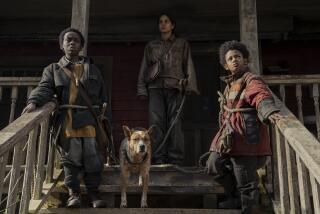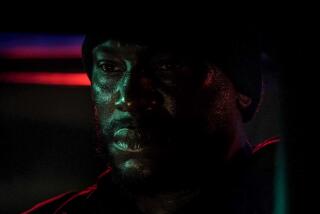Review: Time-warped thriller ‘Don’t Let Go’ is too convoluted for its own good
Movie magic has the power to give a hopeful spin to a murder mystery, and Jacob Estes’ somber thriller “Don’t Let Go” harnesses the elasticity of cinematic time to allow Detective Jack Radcliff (David Oyelowo) to fight for the life of his beloved niece Ashley (Storm Reid) after her brutal murder. The time-traveling investigation is indeed optimistic, but in reality and execution, it’s just magical thinking wrapped up in a fussy, overly convoluted plot.
“Don’t Let Go” is often frustratingly obtuse. Writer-director Estes doesn’t overly explain or hand-hold the audience through this quasi-supernatural, disbelief-suspending story, but a few anchors to reality would have helped root the story in place, offering real stakes and investment in the time-warp tale.
Estes quickly sets up the premise and relationship between Jack and Ashley, who calls Jack frequently to chat, or for a ride, and he’s happy to oblige. So when he receives a panicked, staticky call from her, he heads over to his brother’s (Brian Tyree Henry) home and discovers a grisly murder scene, the entire family killed.
It’s ruled a murder-suicide, attributed all too easily to his brother’s mental illness and former drug-dealing ways, but when Jack receives another call from Ashley, from the past, seemingly from beyond the grave, he starts to investigate the event in a new light. “Don’t Let Go” hesitates to attribute Ashley’s presence to anything spectral or ghostly, asserting, rather, that she’s calling her uncle from an alternate timeline, a few days before her murder. Using clues he gathers, together with Ashley’s observations in the days before her death, Jack fights to solve the murder both before and after it happened, in the hopes he might prevent it.
As Jack tries to exert some change on the past, there are missteps and confusion. And as the murders play out in differing fashion, the crime-scene photos become a game of Spot the Difference, offering new clues and new obstacles. The messiness of the timelines and the logistical details of the tenuous cellular connection between Jack and Ashley often are confounding, despite efforts to clarify the days and weeks that separate them.
The twisty tale doesn’t leave much for us to hook into aside from their relationship, and Reid and Oyelowo make us believe in their connection shared over the phone. But that’s about all we can believe in. Mykelti Williamson and Alfred Molina costar as Jack’s higher-ups at the police department who stand in the way of his investigation, rather than aiding him. The typically great Molina seems to be doing a parody of a stern police boss, while Williamson does what he can as the slippery Bobby, Jack’s friend who isn’t much of a help in his time of need.
Because Estes doesn’t explain the supernatural connection between the past and the present, we’re invited to speculate on its true nature. Is this a trauma-induced hallucination? Estes presents the facts as all too real. But, ultimately, “Don’t Let Go” is a mood piece, an atmospheric blur of grief wrapped up in conspiracy, powered by the unyielding if futile belief that we might have the ability to change our own reality.
Katie Walsh is a Tribune News Service film critic.
‘Don't Let Go'
Rated: R, for violence, bloody images and language
Running time: 1 hour, 43 minutes
Playing: Starts Aug. 30 in general release
More to Read
Only good movies
Get the Indie Focus newsletter, Mark Olsen's weekly guide to the world of cinema.
You may occasionally receive promotional content from the Los Angeles Times.










